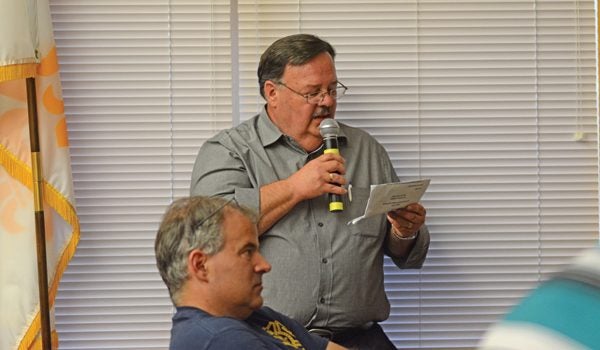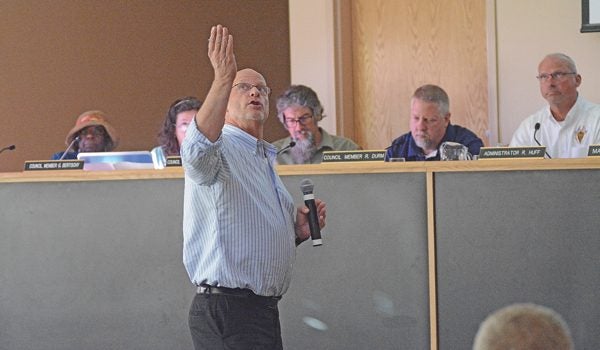Indeck seeking city’s approval on tax abatement, Brownfield incentives
Published 9:52 am Friday, June 16, 2017
Representatives from Indeck went before city council members Monday during a committee of the whole meeting.
The natural gas to energy company, which has proposed building a plant in Industrial Park, is asking for city approval on an incentives program.
The company is seeking a $91 million tax abatement for up to 13 years and a $60 million tax increment-financing plan for up to 30 years, called a Brownfield TIF incentive.
Approval of the proposal would help assist the company in getting financing for the project so that it can go to construction.
The company must obtain city approval on the proposal first, before they can seek state approval for the incentive program.
David Hicks, the vice president of business development for Indeck, said the Niles project is at a stall, due to other competing industries in the energy market having a tax abatement incentives package.
“That program [the tax abatement], if it is approved as it is proposed would put this project on a level playing field and put us in a position to get the financing done,” Hicks said.
Indeck had proposed two separate plans for a plant — less than 20 years ago — and both times, the projects fell through.
Councilman Daniel VandenHeede questioned why the city should approve incentives when the project could end up failing again.
“You know some of us were around the first time Indeck came to town, including myself, and we have seen this show before,” VandenHeede said. “We got left holding the bag last time.”
Hicks said he appreciated VandenHeede’s comments, but retorted that had the company truly given up on the project they would have sold the property it owns in Industrial Park and taken their investments elsewhere.
“The reason that this project did not end up being completed in the past was not a result of Indeck,” Hicks said. “It was a result of the market conditions.”
Hicks said that when Enron, an American energy company, went bankrupt in 2001, other companies in the industry felt the sting of the business collapse across the energy sector.
Hicks said the timing for Indeck-Niles is right now.
“We now have a window to get this project done and to get this project over the goal line,” Hicks said. “We now have the opportunity to put this on a level playing field.”
But VandenHeede was not totally convinced. He cautioned members of the city council to look at the big picture of energy 40 years down the line.
“This is a gas fired power plant. You can talk state of the art all you want, but it is dinosaur gas. It is fossil fuel,” VandenHeede said. “Forty years from now, I sure as heck hope we are not using your dinosaur gas anymore.”
Additionally, he accused
Indeck leaders of not being up front about what was needed for the project’s completion.
“I think you knew full and well what incentives were available,” VandenHeede said. “And you knew full and well that you would be asking for them.”
Councilman John DiCostanzo encouraged council members to have an open mind when listening to the proposal.
“I think it would be within the council’s best interest to take a look at all of the information,” DiCostanzo said. “Any opportunity that we get to increase our inflow of revenue we should take a serious look at.”
Councilman Bob Durm also added that the majority of construction projects require some form of tax abatement.
“At the same time, I think it helps to look at the information closely and let it be a negotiation,” he said.
VandenHeede agreed to approach the proposal with a fresh perspective, but said if the company wanted something from the city, they should just tell them directly what it was.
“Don’t cheerlead it to us,” VandenHeede said. “Just give it to us bluntly, frankly.”
A nearly two-hour presentation and discussion ensued, following VandenHeede’s comment.
The company spent the time emphasizing its need for the incentives. Additionally, Eric Helzer, the Indeck incentives consultant, explained the history of the site in Industrial Park and how former railroad yard activity had left four parcels of land between Progressive and White streets contaminated, making the land a Brownfield.
The company plans to remediate the property.
Mike McCauslin, former mayor and chair of the Brownfield Redevelopment Authority, said that when Indeck purchased the 270 acres in Industrial Park, they bought it for approximately $2.4 million.
“That was about $9,000 an acre for contaminated [expletive] land. That is not a bad deal for the city,” McCauslin said. “Out of that [purchase] we built the fire station that you are sitting in tonight. We also built the skate park downtown.”
Indeck had also promised Niles a new fire truck, which they purchased per the agreement.
He advised council members to take into a consideration that the situation had changed since the company’s earlier project plans fell through, including tax incentives and the energy market itself.
According to City Manager Ric Huff, the city could gain funds culminated from real-property tax value, Public Act 328 tax abatement and Brownfield TIF. He said the company projects the plant could garner almost $1 million per year over a period of 26 years.
Huff said the first 13 years of plant operations are anticipated to gain an annual $121,000 to $147,000 in addition to $45,000 in real property tax incomes, $80,000 in revolving loan fund contribution and capture between $11,000 to $12,000 to defray administrative costs to the city.
The Niles Community Schools would also be expected to receive 100 percent capture on their bond issue.
Huff said the proposal is necessary in a competitive market, where other building location alternatives could be sought across the stateline.
“That is the challenge in being a border community,” Huff said. “There is competition between the states and who is going to get the best tax abatement.”
It is expected to take a couple of months for Indeck to go through the abatement process, if approval is granted. Huff anticipates at least another 30 days for the council to review a draft of the proposal and vet the paperwork, prior to any decision being made from the city.
Hicks said Indeck hopes to have a better idea of where they stand in August.








